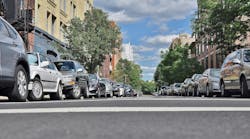Office-to-residential conversions put pressure on curbside management and parking
With many office and commercial buildings being converted to residential use, two important issues—curbside management and parking—are sometimes not given their due attention. Cities need to assess how vehicle storage, bike and bus lanes, and drop-off zones in front of buildings may need to change because of office-to-residential conversions.
Curbside space is a hot commodity for residents who want to be picked up or dropped off near the building entrance.
In commercial and mixed-use settings, short-term parking for delivery drivers is essential. Mass transit stops and parking for cars, bikes, and micromobility vehicles also require curbside space.
City planners are challenged to create traffic configurations and allocate enough space for all uses. Studies of how curbsides are being used can help planners better design solutions.
Added parking meters or activated alleyways are among the possible remedies for office-to-residential conversions.
